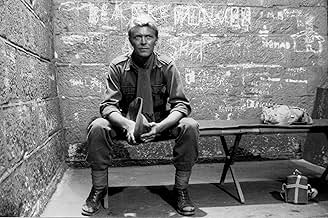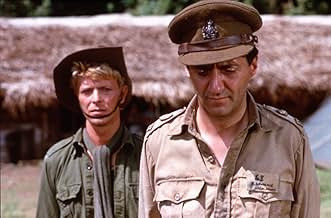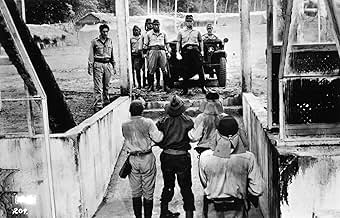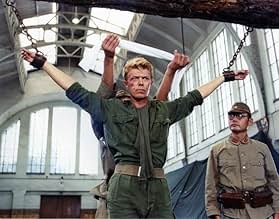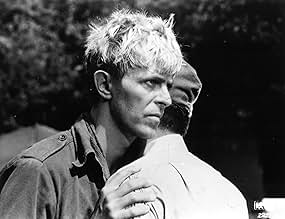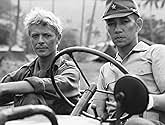Während des Zweiten Weltkriegs versucht ein britischer Oberst, die kulturellen Unterschiede zwischen einem britischen Kriegsgefangenen und dem japanischen Lagerkommandanten zu überwinden, um... Alles lesenWährend des Zweiten Weltkriegs versucht ein britischer Oberst, die kulturellen Unterschiede zwischen einem britischen Kriegsgefangenen und dem japanischen Lagerkommandanten zu überwinden, um Blutvergießen zu vermeiden.Während des Zweiten Weltkriegs versucht ein britischer Oberst, die kulturellen Unterschiede zwischen einem britischen Kriegsgefangenen und dem japanischen Lagerkommandanten zu überwinden, um Blutvergießen zu vermeiden.
- Regie
- Drehbuch
- Hauptbesetzung
- 1 BAFTA Award gewonnen
- 10 Gewinne & 8 Nominierungen insgesamt
- Hara
- (as Takeshi)
- Kanemoto
- (as Johnny Ohkura)
- Commandant of Military Prison
- (as Yuya Uchida)
- President of the Court
- (as Ryunosuke Kaneda)
- Lieutenant Iwata
- (as Takashi Naito)
- Interpreter
- (as Rokko Toura)
- PFC Yajima
- (as Yuji Honma)
Empfohlene Bewertungen
The movie looks at what it means to be human and afraid. It examines how shame and cowardice haunt most men of noble heart. It reveals our commonalities to be undeniably more powerful and real than our transitory differences. It shows how truly stupid man must be to perpetuate the horrors of warfare and to mar his soul by using power to hurt others.
It's a 10/10 in my book, but realistically speaking, if most people agreed, well, there wouldn't be any grist for this mill.
We then see Lawrence following Hara and then Ryuichi Sakamoto's beautiful, eerie music starts off the opening credits. I won't dive any deeper into the plot, as one should witness it for themselves. The film shows us how the prisoners and the guards are not all that different, they both view themselves as being right, when at one point in the film some one says no one is right in war. The film also shows us the physical and the mental abuse the prisoners had to live with day in and day out.
Besides dealing with the war it also shows how man deals with events from the past as far as ones childhood, But in this film it actually works, not like in countless others, and you do feel attached to the characters.
A lot has been said about David Bowie's performance as Major. Jack Celliers, who despite the title of the film is the lead character and does an excellent job portraying a burnt out commando with a past he is afraid to face.
Shortly after seeing the unsubbed version, I saw the subbed version. Which is good in its own right, but I feel the film doesn't have the same impact if you know what is going to happen at every corner, now about half of the film is in Japanese for those with patience it pays off. By not knowing whats going on it puts you in the position of the prisoners themselves.
The film is a beautiful, tragic look at the atrocities man commits to himself. I encourage film and WW II buffs looking for something different to give it a chance. Another unseen by many gem directed by Nagisa Oshima. ****/****
The story is completely about perspectives and motives: power-madness and despair. Some might find MCML hard to stomach while watching, some afterwards. But I say you have to watch it through to appreciate the concepts fully. Moreover, I say you shouldn't vote it before you've seen all of it; that way the rating wouldn't be as low as 6.9. MCML is one of those films that surpass movies like 'Platoon' (Stone, 1986) on any level. Added to all that, it's also beautifully shot by cinematographer Toichiro Naroshima (Double Suicide).
One of the best scores in history of cinema by Ryuichi Sakamoto (also 'Wild Palms' and 'Sheltering Sky'), who not only provides it with his strokes of musical genius, but also plays an important role: the androgynous and curious captain in contrast to the virility of Takeshi Kitano (dir and acted Violent Cop, Brother, Hana Bi) the self-confident and straight-forward sergeant. If you've seen any of Kitano's movies, his character in MCML will gain from that. I guess director Nagisa Oshima (Naked Youth, Gohatto) likes to play with feminine and masculine characters. David Bowie fits in brilliantly from that perspective. His character is the most complex and worked out the deepest. My opinion is that this is his best and most intriguing role so far ('the Man who fell to earth' came close). Conti ('If we'll do it, he'll do it') plays a key figure between the Japanese and the POW.
On which side to lose a war? When to intimidate and when to be intimidated?
Which side are you on anyway? 'There are times victory is very hard to take' - Colonel John Lawrence. Not without reason sergeant Gengo Hara says 'Merry Christmas Mr. Lawrence' not: 'Merry Christmas Colonel Lawrence'. Are you intimidated by an initiation? Or still not when you're POW and the only free part of your body is your head? These are questions the film raises. Unfortunately I can't compare the film to the book, because I haven't read it. MCML is immensely powerful, and really underrated. 10/10
To fully appreciate MCMR, try to understand the culture of both the captors and the prisoners at the time. To the prisoners, their existence in the camp is an unfortunate result of war, and should be temporary and not a life or death experience. To the Japanese captors, the prisoners who surrendered rather than died fighting are cowards, beneath the notice of the captors and likely not even viewed as human beings. They are expendable. But first, in this particular camp, there is an effort to "educate" the prisoners about the way a *true* warrior lives life (and dies). That is where the true conflict begins.
There are multiple physical and psychological struggles going on in MCMR. There is even some homoeroticism, though it isn't fully explained. There is certainly a lot of sadness, for characters on both sides. This point is brought home at the end, when the roles are reversed for two of the characters.
Even today, I can hum several parts of the score to MCMR, and they make me melancholy as I recall scenes from the movie. If you like movies that delve into the darker side of the human spirit (with some lightness thrown in), check out MCML. I rated it an 8.
These are four compelling characters. Tom Conti is solid. Ryuichi Sakamoto is interesting. Takeshi Kitano is absolutely brilliant. David Bowie delivers a mercurial performance. I want the plot to be bigger and more intense. It's also a bit long and meanders in the second half. I do love the final scenes with Hara and Lawrence.
Wusstest du schon
- WissenswertesAccording to David Bowie, Nagisa Ôshima directed the Japanese actors with great detail. But when it came to the British actors, they were told to "do whatever it is you people do".
- PatzerIn the final scene in the prison cell, the cross belt of Lt Col Lawrence's Sam Browne is fitted back to front.
- Zitate
Col. John Lawrence: You are the victim of men who think they are right... Just as one day you and captain Yonoi believed absolutely that you were right. And the truth is of course that nobody is right...
- VerbindungenFeatured in David Sylvian & Ryuichi Sakamoto: Forbidden Colours (1983)
- SoundtracksRide, Ride, Ride (Celliers' Brother's Song)
Composed by Stephen McCurdy
Top-Auswahl
- How long is Merry Christmas Mr. Lawrence?Powered by Alexa
Details
- Erscheinungsdatum
- Herkunftsländer
- Sprachen
- Auch bekannt als
- Merry Christmas Mr. Lawrence
- Drehorte
- Rarotonga, Cookinseln(prisoners camp in Java)
- Produktionsfirmen
- Weitere beteiligte Unternehmen bei IMDbPro anzeigen
Box Office
- Bruttoertrag in den USA und Kanada
- 2.306.560 $
- Eröffnungswochenende in den USA und in Kanada
- 99.221 $
- 28. Aug. 1983
- Weltweiter Bruttoertrag
- 2.376.612 $
- Laufzeit
- 2 Std. 3 Min.(123 min)
- Farbe
- Sound-Mix
- Seitenverhältnis
- 1.85 : 1


